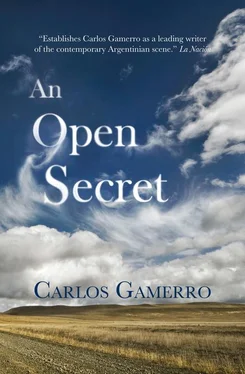“Happens to a lot of people. What between Sandro, the Carnival, the match,” enumerates Iturraspe, once again taciturn, “and the relief, or the resignation — call it what you like — that the damned dog’s day was finally over I don’t think anyone remembered.”
“Remembered what?” I ask.
“The day after,” Iturraspe clarifies. “That Monday morning saw the return from Rosario of Señora Delia de Ezcurra, his mother.”
IN TIMES OF PROSPERITY a parish priest — who only the most elderly have any recollection of, and then only from what they’d been told by their parents — excited at the growing riches promised by modern architecture and the railway, and at the substantial donations the wealthy immigrants couldn’t stop showering on the Lord, set about a task less sustained by faith than by the shared certainty of limitless progress — namely, to cover the ceiling of Malihuel’s church with mosaics. The diocese authorities gave their blessing, the contributions began to pour in stimulated by the priest’s enthusiasm, and Malihuel’s celebrated favourite son, Aníbal Trajano — the creator in his younger days of the equestrian statue of Comandante Pedernera — was commissioned to make a preliminary sketch, which, regardless of its initial vagueness, was approved without further ado so as not to delay the start of the work. The concept couldn’t fail to be to everyone’s liking — from atrium to altar, the glorious epic of Malihuel’s foundation and development would be detailed along the whole length of the nave, from the barbarian desert trodden only by horses’ hooves to the fort founded by the viceroys, the Creole population, the arrival of the immigrants and the railways, and culminating over the altar in a vision of the future, in which the angels of divine grace and the trailblazers of progress would gaze from heaven to earth and earth to heaven in mutual recognition and satisfaction. Specialist workmen arrived, Italians brought in especially from Rosario along with the tesserae, and for months mass was held under a cage of scaffolding that hid the progress of the work from prying eyes. Once the first stretch was finished, the scaffolding was moved over to the centre and tongues began to wag. They were willing to accept Herculean savages with shapely torsos brandishing centaurs’ spears, but not as willing to accept a host of defenceless Indian mothers trying to protect their children from the slaughter that the soldiers, sabres at the ready, were about to wreak on them. This local imitation of the Massacre of the Innocents was soon followed by a portrait of daily life in the fort, featuring the long-suffering figures of the ragged soldiers — one of whom was stretched out between stakes and wore the unmistakeable expression of a suffering Christ — and the tasks of the barrack whores. The proud figure that everyone had thought would represent Malihuel’s founder, when the sketches had been presented in society, turned out to reproduce, in the minute geometry of the tiny ceramic squares, the mythical bandit, Musurana. No sign of angels so far, not even so much as a cross. There are already too many on the altar, came the artist’s answer from on high in the scaffolding, whose fights with the deceived parish priest had reached epic proportions and, according to some, helped in no small way to speed his passage to the Glory of the Lord. And when the priest managed to conquer his proverbial fear of heights and saw with his own eyes that the work intended to celebrate the contribution of the immigrants in fact set out to depict no less than that execrable outbreak of anarchism known as the Cry of Alcorta, the rupture was inevitable. Furious, Malihuel’s very own Michelangelo headed back to Rosario swearing never to return, a promise that proved none too hard to keep, since his advanced years and his health broken by all that hard work brought about his swift demise.
A serrated edge several metres from the holy grail of the altar was as far as the works would ever get. The townsfolk spent several months debating whether to hire another artist to rethink the remaining work and rework what had been completed to the taste of the offended parishioners (but how do you rework a mosaic?), whether they should leave it the way it was because of the artistic merit some people stubbornly saw in it, or whether, as the fanatics and the conned demanded, they should demolish the whole thing and give the ceiling a clean and democratic lick of whitewash. The years, the damp and the poor quality cement employed — supplied, it should be noted, by Don Alejandro Alvarado’s general stores, the brand requested by the artist in his initial budget having been ruled out as too dear — made sure the tiny tesserae began to fall, at first sporadically and almost indiscernibly, then in hail-like profusion. Every morning before Mass, the janitor had to sweep them up off the floor and dump them on a pile, which in view of an ever-less-likely restoration, went on growing, as did the gaps, which stretched saw-tooth tentacles out across the scenes, joined with each other and went on growing, gradually morphing into shapes that were ever more obvious against the polychrome background. One of my most vivid childhood pastimes was to discover in their random and shifting outlines the insects, pirates and astronauts with which my imagination used to alleviate the tedium of the masses my grandmother forced me to attend. I wasn’t the only one — several kids used to spend almost the whole of mass with their chins tilted roofwards and it was only when a tile fell in someone’s eye — a girl’s — and detached her retina, that the opposition to the demolitionists caved in and the trowels had the last word. Years later Don Eugenio Casarico would make off with the heap of tiles in return for a token contribution and use them to tile the first and thereafter most polychromatic swimming pool in Malihuel.
“AND HERE IN THIS ONE are all five of us see? It was for the saint’s day if I’m not wrong because we were the organising committee for the parish association. The photo must’ve been taken by Father Abeledo himself, or he’d be in it. This is Delia de Ezcurra, always so well dressed, and the one next to her’s Clota the Superintendent’s wife, you see what I was saying, she even copied her hair poor thing, never could get over what happened. And here at the other end’s your grandmother, so serious, she and Delia used to be thick as thieves when they were younger but they drifted apart later in life, and they spent their time quarrelling in the association. And these two in the middle believe it or not are Chesi and I, come on own up you didn’t recognise us did you. But I never had a second’s doubt the moment I laid eyes on you, you were always round here playing as a boy, I used to have some felt dolls and you always asked me to get them out of the cabinet and a wooden toothpick holder shaped like a porcupine, as a matter of fact I wanted to give it to you seeing as how you liked it so much but your grandmother never let me, his parents spoil him as it is she used to say. Do you still speak English?”
My Auntie Porota passes me another sugar-laden maté and smiles. Apart from the colour television set, predictably turned down low, showing some afternoon quiz show, the chairs, which look too new, and the photo of her deceased husband on the wall, it’s the same kitchen, flanked by a thin arbour of wisteria, where I used to have my milk and cookies as a boy. Almost lost in the brown imitation-leather armchair with light wood arms, Auntie Chesi flashes me the occasional smile and listens attentively to what her sister has to say, barely looking up from the once-white wool salvaged from her dead husband’s favourite cardie, which, before my horrified eyes, she’s knitting into a little jacket for my son, and which I’ll throw out of the bus window on my way back to Buenos Aires.
Читать дальше












